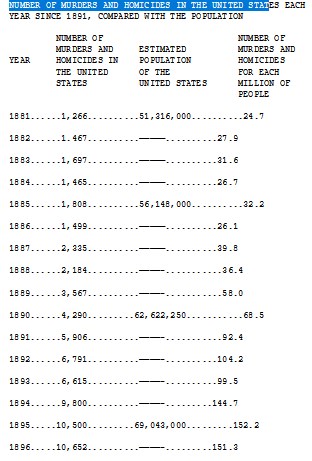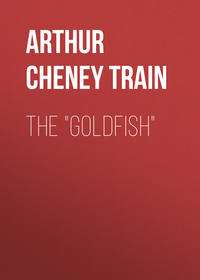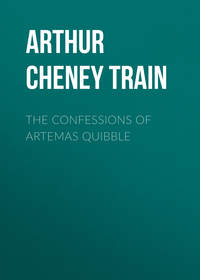 полная версия
полная версияCourts and Criminals
It is, indeed, a sanguinary record, from which little consolation is to be derived, and the only comfort is the probability that the accounts of the first one hundred murders anywhere in Europe would undoubtedly be just as blood-curdling. I had simply asked the clipping bureau to send me one hundred horrors and I had got them. They did not indicate anything at all so far as the ratio of homicide to population was concerned or as to the bloodthirstiness of Americans in general. They merely showed what despicable things murders were.
As to the reasons for the killings, they were as diverse as those which Mr. Nott had prosecuted, save that there were more of an ultra blood-thirsty character, due probably to the fact that the young lady who did the clipping wanted (after one rebuff) to make sure that I was satisfied with the goods she sent me. And this suggests a reason for the large percentage of cold-blooded killings prosecuted by my friend—namely, that Mr. Nott being the most astute prosecutor available, the district attorney, whenever the latter had a particularly atrocious case, sent it to him in order that the defendant might surely get his full deserts.
The reasons for these homicides were of every sort; police officers and citizens were shot and killed by criminals trying to make "get-aways," and by negroes and others "running amuck"; despondent young men shot their unresponsive sweethearts and then either blew out their own brains of pretended to try to do so; two stable-men had a duel with revolvers, and each killed the other; several men were shot for being too attentive to young women residing in the same hotels; an Italian, whose wife had left him and gone to her mother, went to the house and killed her, her sister, her sister's husband, his mother-in-law, two children, and finally himself; the "Gopher Gang" started a riot at a "benefit" dance given to a widow and killed a man, after which they fled to the woods and fired from cover upon the police until eighteen were overpowered and arrested; a young girl and her fiance, sitting in the parlor, planning their honeymoon, were unexpectedly interrupted by a rejected suitor of the girl's, who shot and killed both of them; an Italian who peeked into a bedroom, just for fun, afterward rushed in and cut off two persons' heads with an ax—one of them was his wife; a gang of white ruffians shot and then burned a negro family of three peacefully working in the fields; a man who went to the front door to see who had tapped on his window was shot through the heart; a striker was killed by a twenty-five-pound piece of flagging thrown from a roof; there was a gun fight of colored men at Madison, Wisconsin, at which three were shot; a gang of negro ruffians killed and mutilated a white woman (with a baby in her arms) and her husband; masked robbers called a man to his barn at Winston-Salem, North Carolina, and cut his throat; an Italian was found with his head split in two by a butcher's cleaver; a negress in Lafayette, Louisiana, killed a family of six with a hatchet; a negro farmer and his two daughters were lynched and their bodies burned by four white men (who will probably also be lynched if caught); a girl of eleven shot her girl friend of about the same age and killed her; several persons were found stabbed to death; a plumber killed his brother (also a plumber) for saying that he stole two dollars; a murderer was shot by a posse of militia in a cornfield; a card game at Bayonne, New Jersey, resulted in a revolver fight on the street in which one of the players was killed; bank robbers killed a cashier at twelve o'clock noon; a jealous lover in Butte, Montana, shot and killed his sweetheart, her father, and mother; a deputy sheriff was murdered; burglars killed several persons in the course of their business; Kokolosski, a Pole, kicked his child to death; and a couple of dozen people were incidentally shot, stabbed, or otherwise disposed of in the course of quarrels over the most trivial matters. In almost no case was there what an intelligent, civilized man would regard as an adequate reason for the homicide. They killed because they felt like killing, and yielded to the impulse, whatever its immediate origin.
This conclusion is abundantly supported by the figures of the 'Chicago Tribune' for the seven years ending in 1900, when carefully analyzed. During this period 62,812 homicides were recorded. Of these there were 17,120 of which the causes were unknown and 3,204 committed while making a justifiable arrest, in self-defence, or by the insane, so that there were in fact only 42,488 felonious homicides the causes of which can be definitely alleged. The ratio of the "quarrels" to this net total is about seventy-five per cent. There were, in addition, 2,848 homicides due to liquor—that is, without cause. Thus eighty per cent of all the murders and manslaughters in the United States for a period of seven years were for no reason at all or from mere anger or habit, arising out of causes often of the most trifling character.
Nor are the conclusions changed by the figures of the years between 1904 and 1909.
During this period 61,786 homicides were recorded. Of these there were 9,302 of which the causes were not known, and 2,480 committed while making a justifiable arrest, in self-defence, or by the insane, leaving 50,004 cases of felonious homicides of known causes. Of these homicides, 33,476 were due to quarrels and 4,799 to liquor, a total of 38,275 out of the 50,004 cases of known causes being traceable in this, another seven years, to motives the most casual.
It would be stupid to allege that the reason men killed was because they had been stepped on or had been deprived of a glass of beer. The cause lies deeper than that. It rests in the willingness or desire of the murderer to kill at all. Among barbaric or savage peoples this is natural; but among civilized nations it is hardly to be anticipated. If the negro who shoots his fellow because he believes himself to have been cheated out of ten cents were really civilized, he would either not have the impulse to kill or, having the impulse to kill, would have sufficient power of self-control to refrain from doing so. This power of self-control may be natural or acquired, and it may or may not be possessed by the man who feels a desire to commit a homicide. The fact to be observed—the interesting and, broadly speaking, the astonishing fact—is that among a people like ourselves anybody should have a desire to kill. It is even more astonishing than that the impulse should be yielded to so often if it comes.
This, then, is the real reason why men kill—because it is inherent in their state of mind, it is part of their mental and physical make-up—they are ready to kill, they want to kill, they are the kind of men who do kill. This is the result of their heredity, environment, educational and religious training, or the absence of it. How many readers of this paper have ever experienced an actual desire to kill another human being? Probably not one hundredth of one per cent. They belong to the class of people who either never have such an impulse, or at any rate have been taught to keep such impulses under control. Hence it is futile to try to explain that some men kill for a trifling sum of money, some because they feel insulted, others because of political or labor disputes, or because they do not like their food. Any one of these may be the match that sets off the gunpowder, but the real cause of the killing is the fact that the gunpowder is there, lying around loose, and ready to be touched off. What engenders this gunpowder state of mind would make a valuable sociological study, but it may well be that a seemingly inconsequential fact may so embitter a boy or man toward life or the human race in general that in time he "sees red" and goes through the world looking for trouble. Any cause that makes for crime and depravity makes for murder as well. The little boy who is driven out of the tenement onto the street, and in turn off the street by a policeman, until, finding no wholesome place to play, he joins a "gang" and begins an incipient career of crime, may end in the "death house."
The table on the opposite page gives the figures collected by the 'Chicago Tribune' for the years from 1881 to 1910.
In view of the foregoing it may seem paradoxical for the writer to state that he questions the alleged unusual tendency to commit murder on the part of citizens of the United States. Yet of one fact he is absolutely convinced—namely, that homicide has substantially decreased in the last fifteen years. Even according to the figures collected by the 'Chicago Tribune', there were but 8,975 homicides in 1910 as compared with 10,500 in 1895, and 10,652 in 1896. Meantime the population of our country has been leaping onward.


We are blood-thirsty enough, God knows, without making things out any worse than they are. Our murder rate per 100,000 unquestionably exceeds that of most of the countries of western Europe, but, as the saying is, "there's a reason." If our homicide statistics related only to the white population of even the second generation born in this country we should find, I am convinced, that we are no more homicidal than France and Belgium, and less so than Italy. It is to be expected that with our Chinese, "greaser," and half-breed population in the West, our Black Belt in the South, and our Sicilian and South Italian immigration in the North and East, our murder rate should exceed those of the continental nations, which are nothing if not well policed.
But of one thing we can be abundantly certain without any figures at all, and that is that our present method of administering justice (less the actions of juries than of judges)—the system taken as a whole—offers no deterrent to the embryonic or professional criminal. The administration of justice to-day is not the swift judgment of honest men upon a criminal act, but a clever game between judge and lawyer, in which the action of the jury is discounted entirely and the moves are made with a view to checkmating justice, not in the trial courtroom, but before the appellate tribunal two or three years later.
"My young feller," said a grizzled veteran of the criminal bar to me long years ago, after our jury had gone out, "there's lots of things in this game you ain't got on to yet. Do you think I care what this jury does? Not one mite. I got a nice little error into the case the very first day—and I've set back ever since. S'pose we are convicted? I'll get Jim here [the prisoner] out on a certificate and it'll be two years before the Court of Appeals will get around to the case. Meantime Jim'll be out makin' money to pay me my fee—won't you, Jim? Then your witnesses, will be gone, and nobody'll remember what on earth it's all about. You'll be down in Wall Street practicing real law yourself, and the indictment will kick around the office for a year or so, all covered with dust, and then some day I'll get a friend of mine to come in quietly and move to dismiss. And it'll be dismissed. Don't you worry! Why, a thousand other murders will have been committed in this county by the time that happens. Bless your soul! You can't go on tryin' the same man forever! Give the other fellers a chance. You shake your head? Well, it's a fact. I've been doin' it for forty years. You'll see." And I did. That may not be why men kill, but perhaps indirectly it may have something to do with it.
CHAPTER V. Detectives and Others
A Detective, according to the dictionaries, is one "whose occupation it is to discover matters as to which information is desired, particularly wrong-doers, and to obtain evidence to be used against them." A private detective, by the same authority, is one "engaged unofficially in obtaining secret information for or guarding the private interests of those who employ him." The definition emphasizes the official character of detectives in general as contrasted with those whose services may be enlisted for hire by the individual citizen, but the distinction is of little importance, since it is based arbitrarily upon the character of the employer (whether the State or a private client) instead of upon the nature of the employment itself, which is the only thing which is likely to interest us about detectives at all.
The sanctified tradition that a detective was an agile person with a variety of side-whiskers no longer obtains even in light literature, and the most imaginative of us is frankly aware of the fact that a detective is just a common man earning (or pretending to earn) a common living by common and obvious means. Yet in spite of ourselves we are accustomed to attribute superhuman acuteness and a lightning-like rapidity of intellect to this vague and romantic class of fellow-citizens. The ordinary work of a detective, however, requires neither of these qualities. Honesty and obedience are his chief requirements, and if he have intelligence as well, so much the better, provided it be of the variety known as "horse" sense. A genuine candidate for the job of Sherlock Holmes would find little competition. In the first place, the usual work of a detective does not demand any extraordinary powers of deduction at all.
Leaving out of consideration those who are merely private policemen (often in uniform), and principally engaged in patrolling residential streets, preserving order at fairs, race-tracks, and political meetings, or in breaking strikes and preventing riots, the largest part of the work for which detectives are employed is not in the detection of crime and criminals, but in simply watching people, following them, and reporting as accurately as possible their movements. These functions are known in the vernacular as spotting, locating, and trailing. It requires patience, some powers of observation, and occasionally a little ingenuity. The real detective under such circumstances is the man to whom they hand in their reports. Yet much of the most dramatic and valuable work that is done involves no acuteness at all, but simply a willingness to act as a spy and to brave the dangers of being found out.
There is nothing more thrilling in the pages of modern history than the story of the man (James McPartland) who uncovered the conspiracies of the Molly McGuires. But the work of this man was that of a spy pure and simple.
Another highly specialized class of detectives is that engaged in police and banking work, who by experience (or even origin) have a wide and intimate acquaintance with criminals of various sorts, and by their familiarity with the latters' whereabouts, associates, work, and methods are able to recognize and run down the perpetrators of particular crimes.
Thus, for example, there are men in the detective bureau of New York City who know by name, and perhaps have a speaking acquaintance with, a large number of the pick-pockets and burglars of the East Side. They know their haunts and their ties of friendship or marriage. When any particular job is pulled off they have a pretty shrewd idea of who is responsible for it and lay their plans accordingly. If necessary, they run in the whole gang and put each of them through a course of interrogation, accusation, and browbeating until some one breaks down or makes a slip that involves him in a tangle. These men are special policemen whose knowledge makes them detectives by courtesy. But their work does not involve any particular superiority or quickness of intellect—the quality which we are wont to associate with the detection of crime.
Now, if the ordinary householder finds that his wife's necklace has mysteriously disappeared, his first impulse is to send for a detective of some sort or other. In general, he might just as well send for his mother-in-law. Of course, the police can and will watch the pawnshops for the missing baubles, but no crook who is not a fool is going to pawn a whole necklace on the Bowery the very next day after it has been "lifted." Or he can enlist a private detective who will question the servants and perhaps go through their trunks, if they will let him. Either sort will probably line up the inmates of the house for general scrutiny and try to bully them separately into a confession. This may save the master a disagreeable experience, but it is the simplest sort of police work and is done vicariously for the taxpayer, just as the public garbage man relieves you from the burden of taking out the ashes yourself, because he is paid for it, not on account of your own incapacity or his superiority.
The real detective is the one who, taking up the solution of a crime or other mystery, brings to bear upon it unusual powers of observation and deduction and an exceptional resourcefulness in acting upon his conclusions. Frankly, I have known very few such, although for some ten years I have made use of a large number of so-called detectives in both public and private matters. As I recall the long line of cases where these men have rendered service of great value, almost every one resolves itself into a successful piece of mere spying or trailing. Little ingenuity or powers of reason were required. Of course, there are a thousand tricks that an experienced man acquires as a matter of course, but which at first sight seem almost like inspiration. I shall not forget my delight when Jesse Blocher, who had been trailing Charles Foster Dodge through the South (when the latter was wanted as the chief witness against Abe Hummel on the charge of subornation of perjury of which he was finally convicted), told me how he instantly located his man, without disclosing his own identity, by unostentatiously leaving a note addressed to Dodge in a bright-red envelope upon the office counter of the Hotel St. Charles in New Orleans, where he knew his quarry to be staying. A few moments later the clerk saw it, picked it up, and, as a matter of course, thrust it promptly into box No. 420, thus involuntarily hanging, as it were, a red lantern on Dodge's door.
There is no more reason to look for superiority of intelligence or mental alertness among detectives of the ordinary class than there is to expect it from clerks, stationary engineers, plumbers, or firemen. While comparisons are invidious, I should be inclined to say that the ordinary chauffeur was probably a brighter man than the average detective. This is not to be taken in derogation of the latter, but as a compliment to the former. There are a great many detectives of ambiguous training. I remember in one case discovering that of the more important detectives employed by a well-known private Anti-Criminal Society in New York, one had been a street vender of frankfurters (otherwise yclept "hot dogs"), and another the keeper of a bird store, which last perhaps qualified him for the pursuit and capture of human game. There is a popular fiction that lawyers are shrewd and capable, similar to the prevailing one that detectives are astute and cunning. But, as the head of one of the biggest agencies in the country remarked to me the other day, when discussing the desirability of retaining local counsel in a distant city: "You know how hard it is to find a lawyer that isn't a dead one." I feel confident that he did not mean this in the sense that there was no good lawyer except a dead lawyer. What my detective friend probably had in mind was that it was difficult to find a lawyer who brought to bear on a new problem any originality of thought or action. It is even harder to find a detective who is not in this sense a dead one. I have the feeling, being a lawyer myself, that it is harder to find a live detective than a live lawyer. There are a few of both, however, if you know where to look for them. But it is easy to fall into the hands of the Philistines.
The fundamental reason why it is so hard to form any just opinion of detectives in general is that (except by their fruits) there is little opportunity to discriminate between the able and the incapable. Now, the more difficult and complicated his task the less likely is the sleuth (honest or otherwise) to succeed. The chances are a good deal more than even that he will never solve the mystery for which he is engaged. Thus at the end of three months you will have only his reports and his bill—which are poor comfort, to say the least. And yet he may have really worked eighteen hours a day in your service. But a dishonest detective has only to disappear (and take his ease for the same period) and send you his reports and his bill—and you will have only his word for how much work he has done and how much money he has spent. You are absolutely in his power—unless you hire another detective to watch HIM. Consequently there is no class in the world where the temptation to dishonesty is greater than among detectives. This, too, is, I fancy, the reason that the evidence of the police detective is received with so much suspicion by jurymen—they know that the only way for him to retain his position is by making a record and getting convictions, and hence they are always looking for jobs and frame-ups. If a police detective doesn't make arrests and send a man to jail every once in a while there is no conclusive way for his superiors to be sure he isn't loafing.
There are a very large number of persons who go into the detective business for the same reason that others enter the ministry—they can't make a living at anything else, Provided he has squint eyes and a dark complexion, almost anybody feels that he is qualified to unravel the tangled threads of crime. The first resource of the superannuated or discharged police detective is to start an agency. Of course, he may be first class in spite of these disqualifications, but the presumption in the first instance is that he is no longer alert or effective, and in the second that in one way or another he is not honest. Agencies recruited from deposed and other ex-policemen usually have all the faults of the police without any of their virtues. There are many small agencies which do reliable work, and there are a number of private detectives in all the big cities who work single-handed and achieve excellent results. However, if he expects to accomplish anything by hiring detectives, the layman or lawyer must first make sure of his agency or his man.
One other feature of the detective business should not be overlooked. In addition to charging for services not actually rendered and expenses not actually incurred, there is in many cases a strong temptation to betray the interests of the employer. A private detective may, and usually does, become possessed of information even more valuable to the person who is being watched than to the person to whom he owes his allegiance. Unreliable rascals constantly sell out to the other side and play both ends against the middle. In this they resemble some of the famous diplomatic agents of history. And police detectives employed to run down criminals and protect society have been known instead to act as stalls for bank burglars and (for a consideration) to assist them to dispose of their booty and protect them from arrest and capture. It has repeatedly happened that reliable private detectives have discovered that the police employed upon the same case have in reality been tipping off the criminals as to what was being done and coaching them as to their conduct. Of course the natural jealousy existing between official and unofficial agents of the law leads to many unfounded accusations of this character, but, on the other hand, the fact that much of the most effective police work is done by employing professional criminals to secure information and act as stool-pigeons often results in a definite understanding that the latter shall be themselves protected in the quiet enjoyment of their labors. The relations of the regular police to crime, however, and the general subject of police graft have little place in a chapter of this character.
The first question that usually arises is whether a detective shall or shall not be employed at all in any particular case. Usually the most important thing is to find out what the real character, past, and associations of some particular individual may be. Well-established detective agencies with offices throughout the country are naturally in a better position to acquire such information quickly than the private individual or lawyer, since they are on the spot and have an organized staff containing the right sort of men for the work. If the information lies in your own city you can probably hire some one to get it or ferret it out yourself quite as well, and much more cheaply, than by employing their services. The leads are few and generally simple. The subject's past employers and business associates, his landlords and landladies, his friends and enemies, and his milkman must be run down and interrogated. Perhaps his personal movements must be watched. Any intelligent fellow who is out of a job will do this for you for about $5 a day and expenses. The agencies usually charge from $6 to $8 (and up), and prefer two men to one, as a matter of convenience and to make sure that the subject is fully covered. If the suspect is on the move and trains or steamships must be met, you have practically no choice but to employ a national agency. It alone has the proper plant and equipment for the work. In an emergency, organization counts more than anything else. Where time is of the essence, the individual has no opportunity to hire his own men or start an organization of his own. But if the matter is one where there is plenty of leisure to act, you can usually do your own detective work better and cheaper than any one else.





